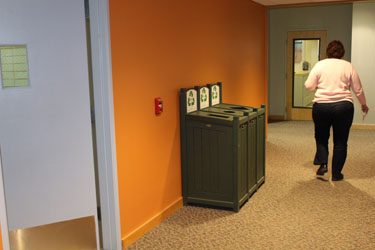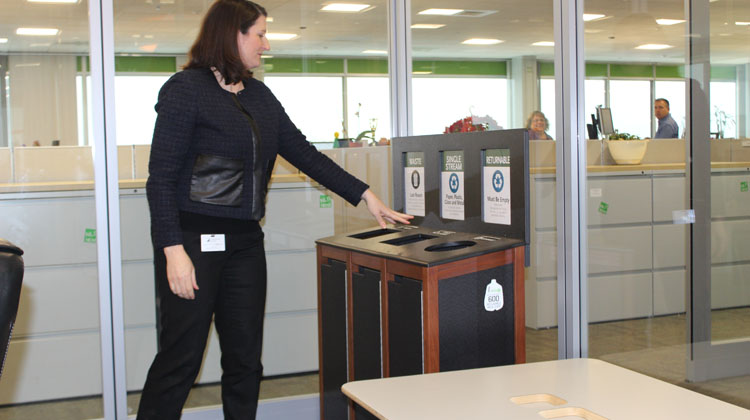Have you heard about the Think Zero campaign? Yes, Zero.
This is a campaign designed to drive down the amount of waste that we send to landfills. And, yes, the goal is to drive it to a big fat Zero.
This is something that’s focused on the Vermont campus because we own the building and we have a greater ability to control what we do. But the goal to reduce waste is companywide.
A lot of new recycling bins have been strategically placed around the building to make it easier to recycle and more understandable about what goes where.
Tim Shea has been working with the state of Vermont, our primary tenant on the Montpelier campus, to build and implement the campaign. So we asked Tim for some details about the program.
 What is the Think Zero campaign and why has National Life launched it? The campaign was created to become a zero waste facility. This means achieving over 90% waste diversion from the landfill through reducing, recycling or reusing. We launched this program to continue our corporate social responsibly mission of being a leader on environmental efforts by reducing our footprint and operating expenses.
What is the Think Zero campaign and why has National Life launched it? The campaign was created to become a zero waste facility. This means achieving over 90% waste diversion from the landfill through reducing, recycling or reusing. We launched this program to continue our corporate social responsibly mission of being a leader on environmental efforts by reducing our footprint and operating expenses.
The goal behind the campaign is zero percent waste. Is that a realistic goal? Has any other company our size accomplished it? I feel the zero waste goal is achievable for the Montpelier campus. There are other organizations from office complexes to large manufacturers around the world who have achieved this goal.
What are the primary obstacles to achieving this goal? The main obstacles are education to our diverse population of nearly 2,000 building occupants, proper receptacles for waste diversion, and finding alternative streams for the waste we generate (other than the landfill).
What can we throw in the trash under this program? Ideally nothing. We currently find a significant amount of recyclables in our waste containers. Going forward, I am hopeful with the proper, well labeled containers we will reduce the amount of waste. As well as “buy-in” from our occupants for meeting our goal of zero waste. This will mean rinsing out containers for recycling, using the compost bins on each floor, and placing all paper in the recycling bins.
Does this initiative cost National Life money or will it save money? It will save us money by reducing our landfill costs. Most of our recyclables will actually generate income. While the income may be modest, the reduction of landfill fees could save us $40,000/year or more.
What’s next? How are we going to get there? We are just kicking off the campaign through awareness and new containers throughout the campus. The campaign will mainly involve education for our campus occupants about what they can be doing to help meet our goal. We will be doing a waste audit to determine the amount of recyclables currently going into our landfill. Once we capture this information, we will try and determine the source of the potential recyclables to educate this population by new means of diversion. We will have other incentive offerings and education tools in the future to create a greater awareness thereby encouraging the desired behavior to reaching our zero waste diversion goal.

